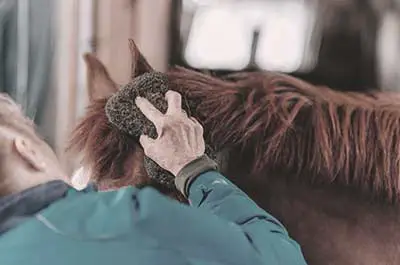Horses are one of the most popular animals in the world. They’re known for being loyal, hardworking, and beautiful. If you’re lucky enough to have a horse of your own, it’s important to understand how to take care of them properly.
This guide will teach you everything you need to know about horse care, from feeding and cleaning to housing and healthcare. Follow these tips, and your horse will be healthy and happy!
Feed your horse the right food and in the right amounts.
As any horse owner knows, a healthy diet is essential for keeping your horse in top condition. The food you feed your horse depends on age, activity level, and health status.
For example, too much grain can lead to weight gain and colic problems, while too little can result in malnutrition.
Young horses need a high-protein diet to support their rapid growth, while older horses may need more fiber to maintain a healthy digestive system. It’s important to talk to a veterinarian or equine nutritionist to figure out the best diet for your horse.
Horses are grazing animals, which means they’re designed to eat small amounts of food throughout the day. That’s why it’s important to have hay available at all times. Horses are mostly herbivores, so their diet should consist primarily of hay, grass, and other plants.
Hay is the best source of nutrients for horses, so make sure you’re giving your horse enough of it. In addition to hay, you should also be feeding your horse grain. Grain should make up about 10% of your horse’s diet.
Horses need to drink a lot of water – up to 10 gallons daily! That’s why it’s important to have a fresh, clean water source available at all times. If you’re using a bucket or trough, clean it out regularly.
Make sure your horse has a clean place to live and sleep.
A horse’s barn should be clean and spacious, with plenty of fresh air and ventilation. The stall or paddock should be large enough for the horse to move around comfortably and be kept clean of debris. Bedding should be provided to absorb urine and help keep the horse’s legs dry.
When choosing a location for your horse’s shelter, consider the weather and the amount of sunlight the area receives.
In warm temperatures, shady areas will help keep your horse cool, while in cold climates, a well-ventilated area will help prevent respiratory problems. There should also be plenty of light to help the horse see and avoid hazards.
The floor should be lined with straw or shavings to provide a comfortable and absorbent surface for the horse to lie down on.
You should sweep out the stall and remove any manure or urine before you bed it down. You should also check the stall regularly for signs of leaks, drafts, or other problems that could make it uncomfortable for your horse.
The walls should be sturdy and without sharp edges that could injure the horse. If you keep your horse’s living quarters clean and well-maintained, they’ll be happier and healthier for it.
Provide your horse with regular exercise.
Horses are meant to move, so it’s important to give them plenty of exercise. The best way to exercise your horse is by riding them, but if you can’t ride for whatever reason, you can also lead them on a walk or let them run around in a paddock. Exercise is important for horses of all ages, but young horses need to help them develop strong bones and muscles.
Exercise also helps keep your horse’s mind healthy and can help prevent boredom. Bored horses are more likely to get into trouble, so it’s important to provide them with plenty of stimulation.
If you can’t ride or exercise your horse every day, give them some form of mental stimulation, such as playing with toys or providing them with access to a pasture.
Paddock and pasture.
Paddock and pasture are two terms often used interchangeably in agriculture, but they refer to two different things. A paddock is a small enclosure where animals can graze, while a pasture is a larger area of land used for grazing. Pastures are typically found on farms, while paddocks are more commonly found on ranches. Paddocks and pastures are important for grazing animals as they provide a safe place to eat and drink.
Horses should have access to a pasture or paddock at all times. Grazing is good for horses’ physical and mental health, so if you have the space, make sure to provide your horse with a place to graze. If you don’t have enough room for a pasture, you can also provide your horse with hay nets or hay bales.
Pastures should be large enough for the horse to move around comfortably and graze freely. They should also be free of debris, such as rocks or broken glass. The grass should be kept short, so the horse doesn’t have to strain to reach the ground. Paddocks should also be fenced in to keep the horse from getting loose.
If you keep your horse healthy and happy, it’ll be a loyal and loving companion for years to come. Horses are social creatures, so they thrive on companionship. If you can’t provide your horse with a pasture mate, consider getting them a dog or another pet that they can bond with.
Groom your horse regularly to keep its coat healthy and free from parasites.
Any horse owner knows that grooming is essential for keeping their animal healthy and free from insects. Although horses are very good at self-grooming, they can’t reach all the places that need to be cleaned.

That’s where regular brushing comes in. By removing dirt, sweat, and dead skin cells, you help your horse’s coat stay healthy and free from parasites. In addition, grooming can also be a great bonding experience for you and your horse.
A healthy coat also helps to regulate body temperature and ward off parasites. Grooming helps to check for any signs of illness or injury. A regular grooming routine should include brushing, combing, and bathing and should be tailored to the individual horse’s needs.
For example, horses with sensitive skin may require special shampoos and conditioners, while those with thick coats may need to be clipped during summer.
By regularly grooming your horse, you can help ensure that its coat remains healthy and free from parasites.
Check your horse’s hooves for cracks or abnormalities.
If you own a horse, you know their hooves are important. Not only do they provide support and balance, but they also help to protect the horse’s legs from injuries.
That’s why checking your horse’s hooves regularly for cracks, or other abnormalities is important. When checking the hooves, pay special attention to the area around the toe and the heels. You should also check the sole of the hoof for any sign of bruising or abscesses.
If you notice any problems, then be sure to take your horse to the vet for a check-up. In most cases, minor cracks can be easily treated with topical ointments or shoes.
However, more serious problems may require surgery or other medical procedures. Taking care of your horse’s hooves can help ensure their health and well-being for years to come.
Give your horse regular baths, especially during the summer months.
Horses sweat a lot, which can lead to skin problems if they’re not properly cleaned. That’s why giving your horse regular baths is important, especially during the summer months. When bathing your horse, use mild soap and avoid getting any water in their eyes, ears, or nose. You should also rinse them off thoroughly to remove all traces of soap.
Bath time is also good for checking your horse for any cuts, scrapes, or other injuries. Be sure to dry them off completely after the bath to prevent them from getting chilled. And, if you’re using any kind of medication on their skin, be sure to follow the instructions carefully.
Train your horse using positive reinforcement methods.
Horses are intelligent creatures that can be trained to perform a variety of tasks. However, it’s important to remember that horses are also individuals with unique personalities.
That’s why it’s important to use positive reinforcement methods when training your horse. This type of training rewards the horse for good behavior and ignores bad behavior. In most cases, horses will respond better to positive reinforcement than negative reinforcement, such as punishment.
Some common positive reinforcement methods include treats, praise, and petting. You can also use toys or games to reward your horse for good behavior. When training your horse, it’s important to be consistent and patient. Horses learn best when given plenty of time to understand what you’re asking of them.
By using positive reinforcement methods, you can train your horse more effectively and build a strong bond between you.
When handling your horse, always use caution and common sense.
Horses are large, strong animals and can be dangerous if they’re not handled properly. That’s why it’s so important to use caution and common sense when handling your horse.
Here are a few tips for safely handling your horse:
- Always approach the horse from the front. Never try to sneak up on them from behind, as they may startle and kick out.
- Never grab the horse’s bridle or reins without first asking for them. The horse may become defensive and bite or strike out.
- When leading the horse, always use a lead rope and never try to lead them by the neck or head.
- If the horse tries to run away, don’t chase after them. Instead, calmly walk in the opposite direction and get their attention by clapping your hands or making other loud noises.
By following these simple safety guidelines, you can help ensure that you and your horse stay safe while handling each other.
Horses are social animals.
Anyone who has spent time around horses knows they are social creatures. In the wild, they form herds in which they graze and protect each other from predators.
When domesticated, they still maintain strong social bonds and often develop close relationships with other horses. When they are isolated from others, they can become anxious and stressed, which can lead to health problems.
They frequently interact with other horses through body language and vocalizations and often develop close relationships with a few particular individuals. This social nature is one of the things that makes horses such enjoyable companions.
They also require regular contact with other horses to stay happy and healthy. For this reason, many horse owners choose to keep their animals in groups, either in pasture or in a barn. This allows them to satisfy their need for social interaction and provides companionship when their owners are not around.
Conclusion.
Horses are intelligent, social animals that can form strong bonds with their owners. They require regular care and attention, including baths, grooming, and hoof care.
Horses also need plenty of exercises and should be trained using positive reinforcement methods. When handling horses, it’s important to use caution and common sense to avoid getting hurt.
By taking care of your horse and providing them with the attention they need, you can develop a strong bond that will last a lifetime. Thanks for reading!

Meet Anna West! A connoisseur of all things stylish, Anna has an innate ability to weave the latest in fashion trends seamlessly into her writings. But her expertise doesn’t stop at fashion for modern women. Within the folds of her articles, you’ll also find a sprinkle of home decoration wisdom, a dash of pet care advice, and thoughtful insights on relationships. While fashion remains her forte, Anna’s multifaceted perspective ensures that her readers get a well-rounded dose of inspiration for various facets of life. Dive into Anna’s world, and discover a blend of style, elegance, and practical wisdom. Stay informed, inspired, and always in vogue with Anna West.
Reviewed By: Joanna Perez and Marcella Raskin
Edited By: Lenny Terra
Fact Checked By: Brenda Tillman
Photos Taken or Curated By: Matthew Mansour
